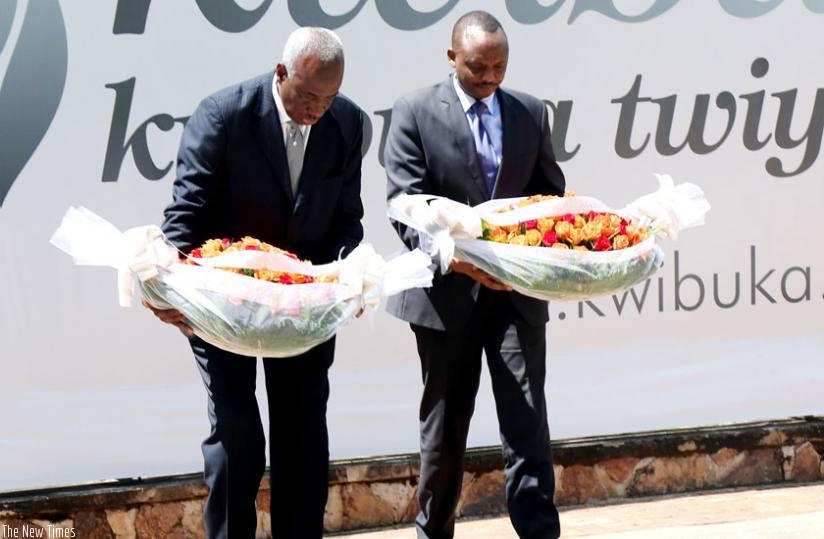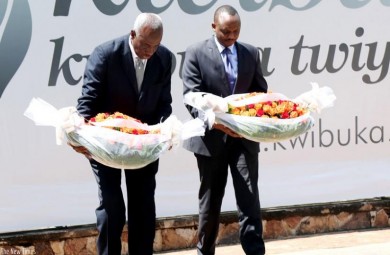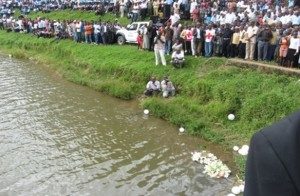
Genocide survivors hopeful of reparations as ICTR winds up.
By Edwin Musoni, The New Times.
The International Criminal Tribunal for Rwanda (ICTR), yesterday, heard the last arguments in the appeal case involving former minister for family affairs and women development Pauline Nyiramasuhuko and five others.
Nyiramasuhuko, the only woman indicted for crimes against humanity, is jointly tried with her son, Arsene Shalom Ntahobali, a former militia leader in the southern town of Butare commune in present day Huye District.
The others are former prefects Sylvain Nsabimana and Alphonse Nteziryayo, as well as Joseph Kanyabashi and Elie Ndayambaje, former mayors of Ngoma and Muganza communes, respectively.
As Rwandans await the final verdict in the longest ever trial by ICTR that has spanned 14 years, the reparation of Genocide survivors still hangs in balance.
If no decision is taken about the reparation of survivors before the tribunal winds up by December, efforts to hold the international community to account for its failures in Rwanda may be farfetched.
However, The New Times understands that both Rwanda and ICTR officials have been devising ways of establishing a reparation mechanism.
“Unfortunately, at the time when the tribunal was established, the issue of compensation of victims was not part of that process. But the system of international justice has evolved to the point where the question of compensation to victims is paramount,” said the Tribunal’s Chief Prosecutor Hassan Bubacar Jallow.
Jallow was speaking at Kigali Genocide Memorial Centre, Gisozi, after paying tribute to victims of the 1994 Genocide against the Tutsi where he was accompanied by Prosecutor-General Richard Muhumuza.

“I think it’s still not too late for the international community, even outside the context of the ICTR, to look into the issue of reparations to ensure that victims are compensated for the suffering that they underwent,” said Jallow.
The deal with IOM
In December, last year, while addressing the UN Security Council, ICTR president Van Joensen said the International Organisation for Migration (IOM) had completed and submitted a draft assessment study to the Government of Rwanda on reparations for victims of the Genocide.
“The assessment study identifies options for reparations for victims and survivors and describes in concrete and operational terms how these options can be developed and implemented in Rwanda as well as how these programmes may be funded. The final report of the study should be issued in the coming months, and transmitted to relevant stakeholders so that follow-up activities can be planned,” said Judge Joensen.
Although the content of the study has been kept confidential, both government and Genocide survivors are optimistic that the move may reap positive results.
“It should be noted that Judge Joensen’s initiative to have a study on reparation is in good spirit. We got a copy of the draft report and also submitted our inputs; we are now waiting for the final report to move forward,” said Dr Jean-Pierre Dusingizemungu, the president of Ibuka, the umbrella of associations advocating for the interests of survivors of the Genocide.
Dusingizemungu shares the same view with Justice minister Johnston Busingye, who said that although the move had taken long, there was need to establish a proper framework for reparations.
“If this succeeds, it would be the first step, then we will have to move forward with mechanisms of implementation with all the stakeholders on board. There is every reason and every justification to hope for the best,” Busingye said.
No date has been set for the release of IOM’s final report.
In May, last year, the Ministry of Justice signed a deal with IOM to conduct a study on how reparations would be carried out.
The comprehensive report is expected to assess and identify in detail options that could be developed, established and implemented in the Rwandan context.
The report will also include how the reparation will be funded, while suggesting strategies to operationalise the proposed compensation option.
The government annually commits 5 per cent of state revenues toward the Fund for the Support of Genocide Survivors (FARG) although the priority for FARG is education, healthcare, shelter and socio-economic welfare for survivors.
Reparation is one of the long-sought-after justice issues in the aftermath of the 1994 Genocide against the Tutsi, mainly because most of those who were convicted either do not genuinely have capacity to pay, or have lied about their ability to pay.
Others are fugitives who have never been brought to book.
EDITORIAL: Reparations for survivors require a concerted effort
By The New Times, 24th April 2015
Many Genocide survivors are still struggling to come to terms with their past. Unless one was in their shoes in 1994, one would not fully comprehend how it feels to lose an entire family and expecting, anytime, to be the next on the list for marauding gangs of genocidaires.
Despite their two decade journey littered with many obstacles, many have managed to persevere, mostly due to the government’s many programmes that escort them along the road to healing.
Apart from the over a million lives lost, many survivors also lost property and few have been compensated, courtesy of the Gacaca courts that tried nearly two million cases. The issue of reparations is a very complex one; most of the foot soldiers who carried out the bulk of the killings have no capacity to pay damages.
The architects of the Genocide, most of whom the elite of society, jumped ship after the Genocide and safely relocated to Europe and North America, out of reach of the Gacaca courts, and just a handful were indicted by the International Criminal Tribunal for Rwanda (ICTR).
But the ICTR came with its flaws; when it was constituted, it left out a very vital issue; that of compensations for victims of the Genocide. But from the look of things, a light seems to be shining at the end of the tunnel.
The tribunal has at last begun to tackle the issue of reparations, despite being at the end of its lifespan, but as the saying goes; better late than never.
Victims lost nearly everything, but one thing they could not afford was hope, and whether the reparations come or not, it will not dampen their spirits. They survived to tell the story of resilience, their driving force.

